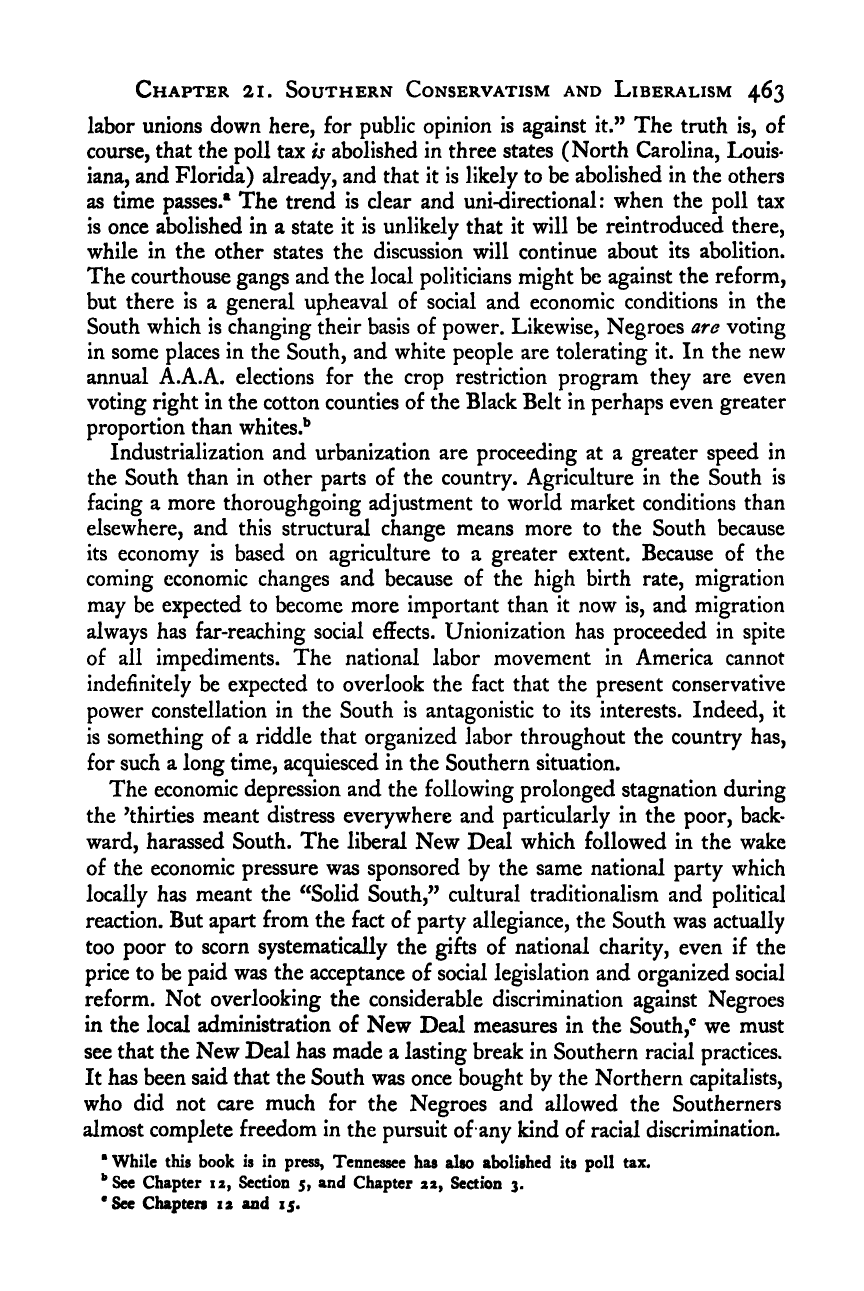Note: Gunnar Myrdal died in 1987, less than 70 years ago. Therefore, this work is protected by copyright, restricting your legal rights to reproduce it. However, you are welcome to view it on screen, as you do now. Read more about copyright.
Full resolution (TIFF) - On this page / på denna sida - V. Politics - 21. Southern Conservatism and Liberalism - 4. The Changing South

<< prev. page << föreg. sida << >> nästa sida >> next page >>
Below is the raw OCR text
from the above scanned image.
Do you see an error? Proofread the page now!
Här nedan syns maskintolkade texten från faksimilbilden ovan.
Ser du något fel? Korrekturläs sidan nu!
This page has never been proofread. / Denna sida har aldrig korrekturlästs.
Chapter 21. Southern Conservatism and Liberalism 463
labor unions down here, for public opinion is against it.” The truth is, of
course, that the poll tax is abolished in three states (North Carolina, Louis-
iana, and Florida) already, and that it is likely to be abolished in the others
as time passes.* The trend is clear and uni-directional: when the poll tax
is once abolished in a state it is unlikely that it will be reintroduced there,
while in the other states the discussion will continue about its abolition.
The courthouse gangs and the local politicians might be against the reform,
but there is a general upheaval of social and economic conditions in the
South which is changing their basis of power. Likewise, Negroes are voting
in some places in the South, and white people are tolerating it. In the new
annual A.A.A. elections for the crop restriction program they are even
voting right in the cotton counties of the Black Belt in perhaps even greater
proportion than whites.**
Industrialization and urbanization are proceeding at a greater speed in
the South than in other parts of the country. Agriculture in the South is
facing a more thoroughgoing adjustment to world market conditions than
elsewhere, and this structural change means more to the South because
its economy is based on agriculture to a greater extent. Because of the
coming economic changes and because of the high birth rate, migration
may be expected to become more important than it now is, and migration
always has far-reaching social effects. Unionization has proceeded in spite
of all impediments. The national labor movement in America cannot
indefinitely be expected to overlook the fact that the present conservative
power constellation in the South is antagonistic to its interests. Indeed, it
is something of a riddle that organized labor throughout the country has,
for such a long time, acquiesced in the Southern situation.
The economic depression and the following prolonged stagnation during
the ^thirties meant distress everywhere and particularly in the poor, back-
ward, harassed South. The liberal New Deal which followed in the wake
of the economic pressure was sponsored by the same national party which
locally has meant the ^^Solid South,” cultural traditionalism and political
reaction. But apart from the fact of party allegiance, the South was actually
too poor to scorn systematically the gifts of national charity, even if the
price to be paid was the acceptance of social legislation and organized social
reform. Not overlooking the considerable discrimination against Negroes
in the local administration of New Deal measures in the South,® we must
see that the New Deal has made a lasting break in Southern racial practices.
It has been said that the South was once bought by the Northern capitalists,
who did not care much for the Negroes and allowed the Southerners
almost complete freedom in the pursuit of any kind of racial discrimination.
* While this book is in press, Tennessee has also abolished its poll tax.
^^See Chapter 12, Section 5, and Chapter 22, Section 3.
*See Chapters 12 and 15.
<< prev. page << föreg. sida << >> nästa sida >> next page >>